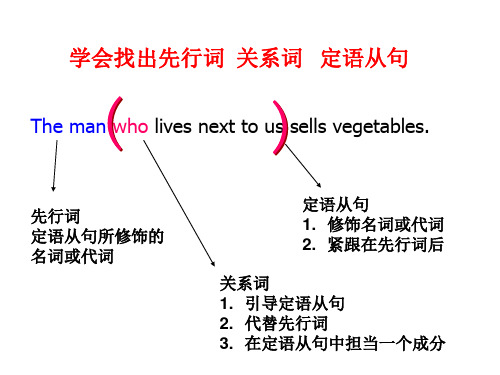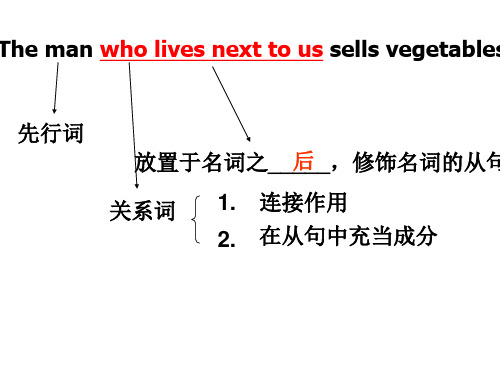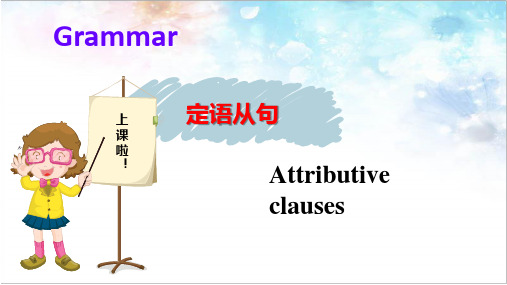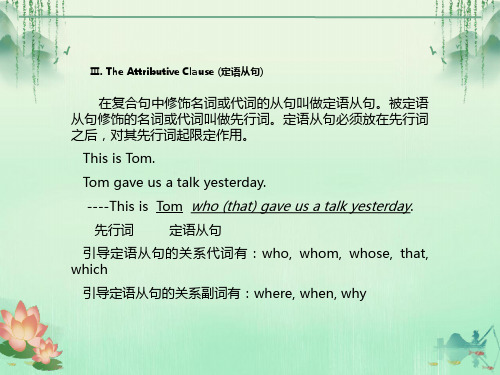定语从句复习课件
3定语从句复习课件共64张PPT

center,____ they learn simple games and songs. A. then B. there C. while D. where
学会找出先行词 关系词 定语从句
The man who lives next to us sells vegetables.
先行词 定语从句所修饰的 名词或代词
定语从句 1. 修饰名词或代词 2. 紧跟在先行词后
关系词 1. 引导定语从句 2. 代替先行词 3. 在定语从句中担当一个成分
Have a try
(2)He has two children, both of ___are abroad.
A. them B. which C. whom D. who 介词后指人只能用whom
• 定语从句的做题思路 • 定语从句三步: • 第一找出先行词; • 第二看先行词在定语从句中的语法功能(做主语、
宾语或状语);
A. that B. the one C. which D. where
1. Is this the factory __________ you visited the other day?
2.Is this factory __________ some foreign friends visited last Friday?
A. when B. what C. that D. in which
I still remember the days _____ we worked together. A. when B. what C. that D. for which
高三定语从句复习ppt课件

The man who lives next to us sells vegetables
先行词
放置于名词之__后___,修饰名词的从句
关系词
1. 连接作用 2. 在从句中充当成分
放于句中或句首 “正如”
2. 关系副词when where why (状语)
病原体侵入机体,消弱机体防御机能 ,破坏 机体内 环境的 相对稳 定性, 且在一 定部位 生长繁 殖,引 起不同 程度的 病理生 理过程
考点一:关系代词:
as
D 1、_____ is often the case, we have
病原体侵入机体,消弱机体防御机能 ,破坏 机体内 环境的 相对稳 定性, 且在一 定部位 生长繁 殖,引 起不同 程度的 病理生 理过程
1. 指人 that who
1.关系代词
whom whose
2. 指物 (主语/宾语)
that which whose
3. 指某一情况 which as
关系词
不能放于句首
病原体侵入机体,消弱机体防御机能 ,破坏 机体内 环境的 相对稳 定性, 且在一 定部位 生长繁 殖,引 起不同 程度的 病理生 理过程
考点四: whose指物时可与of which 等互换,但应注意与冠词的位置关系。 如:
the cover of which
This is the book
whose cover
He is such a good teacher __B__ we all
love and respect. 定语从句
定语从句复习总结资料课件(共15张)

特殊情况
• 1. 只能用 that 的情况: (1)序数词或形容词最高级修饰先行词时; This is the first play that I have seen since I came here.
(2)先行词被every, some, no, all, any, little, much等修饰时; I have read all the books that you lend me.
指物
指人
主语 who that
which that
指物
宾语 whom who that which that
定语 whose (of whom)
whose (of which)
The man who/that is speaking at the meeting is a worker. This is a car which / that is made in China.
(3)everything, something, nothing, all, anything, little, much等不定代词作先行词时; Everything that we saw in this film was true. (4)先行词被 the only, the very, the same, the last 修饰时; This is the only book that belongs to him. (5)主句已有who或which时; Who is the girl that is standing under the tree. (6)当先行词同时指人或物时;
关系代词和关系副词的区别
• 关系代词在定语中作主语、宾语; • 关系副词在定语从句中作状语。 • The man who is speaking at the meeting is a worker. • Zhuzhou is the city where I was born.
定语从句(18张PPT)初中英语专项复习课件

(2)先行词被特定缠,that抢先把位占。 当先行词被the only, the very, the same, the right 等修饰时,关系代词用that 而不用which The white flower is the only one ( that) I really like.
What is the attributive clause? (什么是定语从句)
定语从句:在复合句中修饰名词或代词,在句子中起定 语作用的从句。
Huitailang is a wolf who is very bad..
先行词 关系词 定语从句 先行词: 被修饰的名词或代词 关系词:1.连接从句;2.替代先行词;
THANK YOU
The girl is Gu Ailing. 分解
The girl’s hair is yellow. whose在定语从句中作定语
关系代词 who whom which that whose
可指代
人 人 物 人、物 人、物
从句中的成分
主语、宾语 宾语
主语、宾语 主语、宾语
定语Βιβλιοθήκη that和which在指物的情况下一般都可以互换, 但在下 列情况下, 一般用that而不用which。 (1) 先行词为不定代词all,much,little,something, everything,nothing,none等,that来把which踹。
The lady whom my teacher talked with is my mother.
高中英语《定语从句》复习公开课课件

The company_w_h__e_re__ I worked last year is very famous.
The company is very famous.
I worked there last year. 关系词在从句中做状语
The company(t_h_a_t_/_w_hich) I visited last year is very famous.
关系词在从句中做宾语
The company_w__h_e_r_e_ I worked last year is very famous.
The company is very famous.
I worked in the company last year.
关系词在从句中做介词 宾语
The company(t_h_a_t_/_w_hich)I visited last year is very famous.
关系词在从句中做状语
I will never forget the day_(t_h_a_t_/_w_hich) I spent with you.
I will never forget the day.
关系词在从句中做宾语
We first met each other on that day.
• 从他们结婚那一年以来,我就再也没见过他们。 • 学到老,活到老。 • 那位老妇人在他儿子到的那天去世了。
I will never gorget the day_(t_h_a_t_/w__hich) I spent with you.
I will never forget the day.
关系词在从句中做宾语
定语从句复习课件ppt

( ) 6. Mr. Green told me that he on a trip next Sunday. (通化)
B A. are going B. was going C. will go
D. would going
( ) 7. Our geography teacher told us that Japan
● Which is the book that was stolen by him?
02
先行词是主句的表语或关系代词在定语从句中作表语 ○ 时。 ○ e.g. China is no longer the country (that) it used to be.
三、关系副词where, when, why引导的定语从句 (在从句中作状语)
1. where表示地点,它引导的定语从句修饰表地点的先行词。 e.g. This is the village where he was born. c.f. This is the village (that/which) he visited last year. 2. when表示时间,它引导的定语从句修饰表时间的先行词。 e.g. I’ll never forget the day when I joined the League. c.f. I’ll never forget the day (that/which) we spent together.
A. that
B. which
C. what
D. /
B
( ) 4. We’re talking about Tonny, you met yesterday.
A. with who B. whom
( C ) 5. Is this the very museum last
高考英语二轮复习:定语从句课件(共31张PPT)
2Ja. c关k系is词th指e 人bo,y 且to在w介ho词m的w后e s面ho,u只ld能of用fewr hoemlp。.
高考英语二轮复习:定语从句课件(共 31张PP T)
高考英语二轮复习:定语从句课件(共 31张PP T)
高一定语从句复习
高考英语二轮复习:定语从句课件(共 31张PP T)
4. 先行词被the only, the very, the same, et.hge. Hlaesti,stthheenoenxlyt修pe饰rs时on,th用at tIhwaat。nt to see now.
高考英语二轮复习:定语从句课件(共 31张PP T)
高考英语二轮复习:定语从句课件(共 31张PP T)
三、定语从句中关系词的选择
具体步骤:
找 出先行词 代之入从句 (补充)使完整 替入关系词
注意点:
高考英语二轮复习:定语从句课件(共 31张PP T)
1.主从句要完整
2. that不可用于非限 制性定语从句;which 可指代整个主句。
高考英语二轮复习:定语从句课件(共 31张PP T)
高一定语从句复习
高考英语二轮复习:定语从句课件(共 31张PP T)
A. 为以下情况时,只用that,不用which
1e..先g. 行Fin词a为lly不, th定e 代thi词ef ahlal,nndoendee,vferwy,tlhititnlge, m(tuhcaht), hseomhaedthsitnogle,na.nything, nothing, everything, etc。
初中定语从句复习ppt课件
2. Everything that on show is made in China.
以下情况只能用that 引导
c. 先行词被the only, the very, the same, the last, little, few 等词修饰时,只能用 that,而不用which.
c. 引导非限制性定语从句,用which, 而不用that. e.g. Tom came back, which made us happy.
五、关系副词when, where, why的用法
when ——指时间,其先行词表示时间, 在句中作时间状语。
e.g. 1. This was the time when he arrived.
some pictures that I saw in the room.
2. They know the girls and the cars that are over there.
以下情况只能用that 引导
e. 以who 或which 引导的特殊疑问句,为 避免重复,只能用 that.
e.g. 1. Who is the girl that is crying? de abroad?
2. I still keep the letters which she wrote to me.
3. I lost the pen which my father bought me.
who——用于指人 (在句中做宾语时用 whom)。
e.g. 1. Do you know the girl who is wearing a white T-shirt? 2. His father is the person who will be the most unhappy. 3. Who is the teacher (whom) Li Ming is talking to?
【课件】定语从句复习课件-高一英语人教版(2019)必修第一册
定语从句注意点 ③:
定语从句的主谓一致问题
例句1中,谓语动词是第三人称单数,lives 例句2中,谓语动词是复数have
3.先行词是一个句子 Tom was late, which surprised me. 汤姆迟到了,这让我很吃惊。
(三)that可以代指“人”,也可以代指“物”
-【例】They talked about the classmates that they remembered. -【例】They talked about the things that they remembered .
2.who在从句中主语、宾语都可以做,whom只可做宾语 A rich person is not the one who has the most, but is the one who needs least. 一个富有的人,不是因为他拥有的最多,而是因为它需要的最少。
(二)先行词指“物”,用关系词which
(一)何为定语从句
定义:用来修饰名词或代词的从句
※主从句
I don’t like people who never keep their word. 我不喜欢不守信用的人。 从句内含有完整的主谓结构,并且前面有修饰的名词或者代词。
I can do everything for someone who I love. (先行词是不定代词someone) 我可以为我爱的人做一切。
(四)表示人或物的所有关系,用whose
-【例】I know a friend. His brother is a pop singer. 我认识一个朋友,他的哥哥是一名流行歌手。 I know a friend whose brother is a pop singer.
初中英语定语从句课件(23张)
1) I prefer shoes that cool. 2) I like a pizza that really delicious. 3) I love singers who beautiful. 4) I have a friend who sports.
who/that
who/that/whom
that/which
who/that/whom
主语
宾语
宾语
宾语
who, that指人的用法区别.
只能用who,不能用that:
√当one, ones, anybody, anyone, those 等作先行词时〔 指人〕一般用who,不用that.
Those who want to go to the cinema will have to wait at the gate of the school.
who, that指人的用法区别.
只能用that ,不能用who:
√当主句是以who开头的特殊疑问句时
Who is the woman that you talked with just now?
which和that指物的区别:
只能用which,不能用that
The school in which he once studied is very famous.
√介词后面只能用which
1) 先行词既有人又有物时;
√ 只用that不用which
- 1、下载文档前请自行甄别文档内容的完整性,平台不提供额外的编辑、内容补充、找答案等附加服务。
- 2、"仅部分预览"的文档,不可在线预览部分如存在完整性等问题,可反馈申请退款(可完整预览的文档不适用该条件!)。
- 3、如文档侵犯您的权益,请联系客服反馈,我们会尽快为您处理(人工客服工作时间:9:00-18:30)。
定语从句复习课件1、关系代词:who, whom, whose, which, that, as2、关系副词:when, where, why关系代词和关系副词必须位于从句之首,主句先行词之后,起着连接先行词和从句的作用,同时在从句中又充当句子成分。
e.g. She is the girl who sings best of all.(关系代词who在从句中作主语)The rade with whom I came knows French.(whom在从句中作介词with的宾语)3、关系代词和关系副词的用法:1)领先行词为人时用who 作主语,whom作宾语;2)领先行词为物或整个句子时用which ,可作主语或宾语;3)先行词为人、物时用that ,可作主语或宾语;4)whose用作定语,可指人或物;5)关系副词when(指时间,在定语从句中作时间状语,where(指地点,在定语从句中作地点状语),why(指原因,在定语从句中作原因状语)。
e.g. I was the only person in our office who was invited.(去掉定语从句,意思就不完整)e.g. Tom’s father, who is over sixty, still works hard day and night.(who引导非限制性定语从句,整个句子可分成两句来翻译)e.g. There is nothing that can prevent him from doing it. 没有什么能阻止他不干那件事。
The first place that they visited in Guilin was Elephant Trunk Hill. 在桂林他们所参观的第一个地方是象鼻山。
This is the best film that I have ever seen. 这部电影是我看过的最好的一部。
Mr Smith is the only foreigner that he knows. 史密斯先生是他认识的唯一的外国人。
e.g. He had failed in the maths exam, which made his father very angry. 他数学考试没有及格,这使他的父亲很生气。
This is the room in which my father lived last year. 这是父亲去年居住过的房子。
①as引导限制性定语从句通常用于the same … as, such … as结构中。
e.g. I want the same shirt as my friend’s. 我要一件跟我朋友一样的衬衫。
Such machines as are used in our workshop are made in China. 我们车间使用的这种机器是中国制造的。
②as引导非限制性定语从句既可放在主句之前,也可放在主句之后,用来修饰整个句子。
通常用以下句型:as is known to all, as is said, as is reported, as is announced, as we all know, as I expect 等。
e.g. As I expected, he got the first place again inthis mid-term examination. 正如我所预料的那样,他在这次期中考试中又获得了第一名。
①当主句和从句语义一致时,用as;反之,用which来引导非限制性定语从句。
e.g. He made a long speech, as we expected.He made a long speech, which was unexpected.②当非限制定语从句为否认时,常用which引导。
e.g. Tom drinks a lot every day, which his wife doesn’t like at all.e.g. The man who lives downstairs speaks English fluently. 住在楼下的那个人英语说得很流利。
The students who are in Grade Three are going to climb the hill tomorrow.e.g. There is an expression in his eyes that I can’t understand.4. 引导定语从句的关系副词有时可以用“介词+ which”来代替。
e.g. October 1, 1949 was the day on which ( = when ) the People’s Republic of China was founded.5. 当定语从句中谓语动词是带介词或副词的固定短语动词时,短语动词的各个固定局部不要拆开。
e.g. The sick man whom she is looking after is her father.6. 介词在关系代词前,只能用which和whom,且不能省略;介词在句尾,关系代词可有which, that, whom, 口语中也可用who,且可省略。
e.g. The man (whom/ who/ that) you were talking about has e to school.1. The fan is on the desk. You want it.2. The man is in the next room. He brought our textbooks here yesterday.3. The magazine is mine. He has taken it away.4. The students will not pass the exam . They don’t study hard.5. The woman is our geography teacher. You saw her in the park.6. The letter is from my sister. I received it yesterday.7. The play was wonderful. We saw it last night.8. The train was late. It was going to Nanning.9. The boy is my brother. He was here a minute ago.10. The tree is quite tall. He is climbing it.11. Here is the girl. Her brother works in this shop.12. That’s the child. We were looking at his drawing just now.13. This is the boy. His sister is a famous singer.14. I want to talk to the boys. Their homework haven’t been handed in.15. Is that the woman? Her daughter is in my class.16. He used to live in a big house. In front of it grew many banana trees.17. They passed a factory. At the back of the factory there were rice fields.18. The soldier ran to the building. On the top of it flew a flag.19. In the evening they arrived at a hill. At the footof the hill there was a temple.20. She came into a big room. In the middle of it stooda large table.1. The person I spoke just now is the manager that I told you about.2. The pencil he was writing broke.3. Wu Dong, I went to the concert, enjoyed it very much.4. The two things Marx was not sure were the grammar and some of the idioms of English.5. Her bag, she put all her books, has not been found.6. The stories about the Long March, this is one example, are well written.1. The man visited our school yesterday is from London.A. whoB. whichC. whomD. when2. The woman is talking to my mother is a friend of hers.A. whoseB. whoC. whomD. which3. Because of my poor memory, all you told me has been forgotten.A. thatB. whichC. whatD. as4. Do you remember those days we spent along the seashore very happily?A. whenB. whereC. whichD. who5. Tom did not take away the camera because it was just the same camera he lost last week.A. whichB. thatC. whomD. as6. Those want to go please sign their names here.A. whomB. whichC. whoD. when7. Where is the man I met this morning?A. whenB. whereC. whichD. who8. Who is the woman is sweeping the floor over there?A. whoB. /C. thatD. when9. The man you talked just now is a worker.A. whoB. whomC. to whomD. to who10. The man you are going to make friends is my father’s neighbour.A. with whomB. whenC. to whomD. which11. The doctor is leaving for Africa next month.A. the nurse is talking to himB. whom the nurse is talkingC. the nurse is talking toD. who the nurse is talking12. The man around our school is from America.A. which you showedB. you showed himC. you showedD. where you showed13. He talked about a hero no one had ever heard.A. of whomB. from whomC. about thatD. who14. In fact the Swede did not understand the three questions were asked in French.A. whereB. whoC. in whichD. which15. Have you read the book I lent to you?A. thatB. whomC. whenD. whose16. Finally, the thief handed over everything he had stolen to the police.A. thatB. whichC. whateverD. all17. The foreign guests, were government officials, were warmly weled at the airport.A. most of themB. most of thatC. most of whomD. most of those18. This is the very letter came last night.A. whoB. whichC. thatD. as19. I know only a little about this matter; you may ask knows better than I.A. whoeverB. whomeverC. anyoneD. the one20. This is the school we visited three days ago.A. whereB. /C. whenD. what21. This is the factory we worked a year ago.A. whereB. thatC. whichD. on which22. Nearby were two canoes they had e to the island.A. whichB. in whichC. thatD. /23. Jack is pleased with you have given him and all you have told him.A. that, whatB. what, thatC. which, whatD. that, which24. Do you work near the building colour is yellow?A. thatB. whichC. itsD. whose25. In the dark street, there wasn’t a single person she could turn for help.A. whomB. whoC. to whomD. form whom26. Is this school we visited three years ago?A. the oneB. whichC. thatD. where27. Is this the school we visited three years ago?A. the oneB. whereC. in whichD. /28, How many students are there in your class homes are in the country?A. whoseB. whoC. whomD. which29. Alice received an invitation from her boss, came as a surprise.A. itB. whichC. thatD. he30. The train was crowded and I had to get into a carriage already seven other people.A. when there wereB. which there wereC. that there wereD. where there were31. I live in the house windows face south.A. whichB. whoseC. whereD. in that32. ---- What game is popular with them? ---- The most is tennis.A. game they like itB. game they likeC. best game they likeD. best game they like it33. They stayed with me three weeks, they drank allthe wine I had.A. whichB. which timeC. during which timeD. during which34. The room Mr White lives is not very large.A. thatB. whichC. whereD. when35. Don’t forget the day you were received into the Youth League.A. whenB. thatC. at whichD. where36. I’ve finished writing the novel, is to be published next month.A. thatB. whatC. whichD. when37. He returned home safe and sound after a fierce battle, was unexpected.A. whichB. asC. thatD. it38. we is known to all, English is not very difficultto learn.A. WhatB. AsC. ThatD. Which39. The old man had three sons, all of died during World War Ⅱ.A. whoseB. thatC. whomD. who40. I have bought two pens, write well.A. none of whichB. neither of whichC. both of whichD. all of which41. Do you know the reason she has changed her mind?A. whyB. whichC. for thatD. of which42. He failed in the exam, proves that he wasn’t working hard enough.A. whichB. whatC. itD. that43. During the week he tried to collect materials for his article.A. followingB. followedC. to followD. that followed44. was expected, he sueeded in the exam.A. ItB. WhichC. AsD. That45. He studied hard and later became a well-known writer, his father expected.A. that was whatB. what was thatC. and which wasD. which was what46. We should read such books will make us better and wiser.A. whenB. asC. whoseD. what47. You must show my wife the same respect you show me.A. whenB. asC. whoseD. what48. He is absent is often the case.A. whatB. whichC. whoD. as49. It is the first time I have e to your city.A. thatB. whichC. whatD. when50. Who has the same idea as it will do it in this way.A. whoB. thatC. whomD. which51. I shall never forget those years I lived in the country with the farmers, has a great effect on my life.A. that, whichB. when, whichC. which, thatD. when, who52. This is the only book I can find.A. thatB. whichC. itD. with which53. I don’t like you speak to her.A. the wayB. the way in thatC. the way whichD. the way of which54. That is one of those books that worth reading.A. isB. areC. hasD. have55. This is the only one of the students whose handwriting the best.A. isB. areC. hasD. have56. There was to prevent the aident.A. something could doB. anything we could doC. nothing we couldn’t doD. nothing we could do一、1. The fan that you want is on the desk. 2. The man who brought our textbooks here yesterday is in next room. 3. The magazine which he has taken away is mine. 4. The students who don’t study hard will not pass the exam. 5. The woman you saw in the park is our geography teacher. 6. The letter I received yesterday is from my sister. 7. The play that we saw last night was wonderful. 8. The train which was going to Nanning was late. 9. The boy who washere a minute ago is my brother. 10. The tree he isclimbing is quite tall. 11. Here is the girl whose brother works in this shop. 12. That’s the child whose drawing we were looking at just now. 13. This is the boy whose sisteris a favous singer. 14. I want to talk to the boy whose homework hasn’t been handed in. 15. Is that the woman whose daughter is in my class? 16. He used to live in a big house, in front of which grew many banana trees. 17. They passed a factory, at the back of which there were rice fields. 18. The soldier ran to the building, on the top of which flew a flag. 19. In the evening they arrived at ahill, at the foot of which there was a temple. 20. She came into a big room, in the middle of which stood a large table.二、1. to whom; 2. wiht which; 3. with whom; 4. about which; 5. in which; 6. of which三、1~5 ABACD 6~10 CDCCA 11~15 CCADA 16~20 ACCAB 21~25 ABBDC26~30 ADABD 31~35 BBDCA 36~40 CABCC 41~45 AADCD 46~50 BBDAB。
